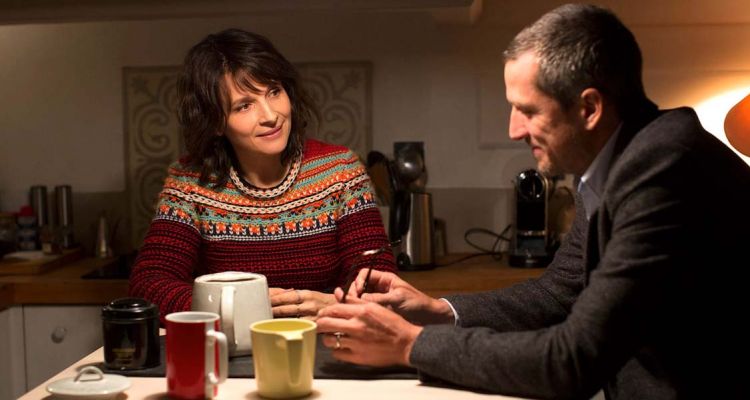TELLURIDE – Over his 30-year career, Olivier Assayas has consistently demonstrated that he’s a filmmaker full of surprises. He’s written and directed thrillers, supernatural dramas, romances, and gut-punching serious dramas, but despite all his genre-hopping, he’s never really made a straight-out comedy. Obviously, nothing the French filmmaker touches is ever singularly one genre and that’s one reason why his latest effort, “Non-Fiction,” turns out to be a comedy with some sophisticated thoughts on media, relationships and the current state of the world.
READ MORE: 9 Must-See Premieres At The 2018 Telluride Film Festival
Set in contemporary Paris, the film is primarily about two couples with professional and inter-personal connections. There’s Alain (Guillaume Canet, hasn’t been this good in forever), the head of a French publishing house that is struggling to adapt to the quickly changing tastes and demographics of readers in the 21st Century. Alain’s wife is Selena (Juliette Binoche, having a blast), an actress on a popular French crime drama where she plays a “crisis management expert” but, to her frustration, everyone simply refers to her character as a generic “cop.” Selena is having an affair with Leonard (Vincent Macaigne, very good), an author still living off the success of a novel published years ago (titled “Foundation,” no less) who also happens to be a client of Alain’s. Leonard’s longtime girlfriend is Valérie (Nora Hamzawi, wonderfully non-verbal), a political aide to a Socialist politician with big aspirations. Valérie could seemingly care less about the publishing world or entertainment which puts her almost on the outside looking in to Léonard, Alain and Selena’s lives. Alain is also having an affair with his new head of digital operations, Laure (Christa Théret, smart), an upwardly mobile twentysomething who seemingly has little emotional interest in her multiple lovers.
READ MORE: Watch the first two clips of “Non-Fiction” with Juliette Binoche
Much of the film occurs overlong, somewhat intellectual (and yet often intentionally funny) conversations about one topic or another. We first get the tone of what Assayas is going for when Léonard has lunch with Alain fishing for an answer as to whether his latest manuscript will get published. Léonard’s novels are clearly autofiction, a fictionalized autobiography of his own life so that it’s easy for readers to recognize who a character really is and Alain seems tired of it. Not surprisingly, Léonard doesn’t see it that way. Over the course of their lunch, Alain tries to convey to him the increasingly low returns his books have provided as Léonard jokes that “everyone has one” that bombs to which Alain quickly dismisses. As their lunch ends Léonard finally asks the fate of his new book and, surprised, Alain replies, “I thought that was obvious.” The answer is, obviously, no.
READ MORE: 55 Must-See Films: The 2018 Fall Movie Preview
The fate of Léonard’s book becomes a recurring theme as he convinces Selena to champion it and hunts for another publisher. The state of the publishing world also threads through the film as characters debate who still reads (older women), what they read (e-book sales are dropping, print is reviving in the U.S.) and whether tweets can be considered literature (interesting points on both sides). Frankly, when these conversations first begin you start to think Assayas is venturing into some “back in my day” arguments that are over a decade old (the term blog is used so many times you might cringe), but as the film proceeds, they start to coincide with his thoughts on relationships. Is he using his characters to argue the value open relationships? Is he saying Alain and Selena as well as Léonard and Valérie’s relationships are more than who they sleep with? Well, assuming Léonard doesn’t use it a storyline for his next novel, sure (and that’s something none of the other characters can count on).
Assayas has often shown great wit in his screenplays (most recently in “Clouds of Sils Maria”), but there is a rhythm to his writing here that is surprisingly good. So much so you can almost catch the glee in Binoche’s face before she drops one zinger after another. And we’ll say this, you’ll never think of Michael Haneke’s “The White Ribbon” the same way ever again. [A-]
Check out all our coverage from the 2018 Telluride Film Festival here.


